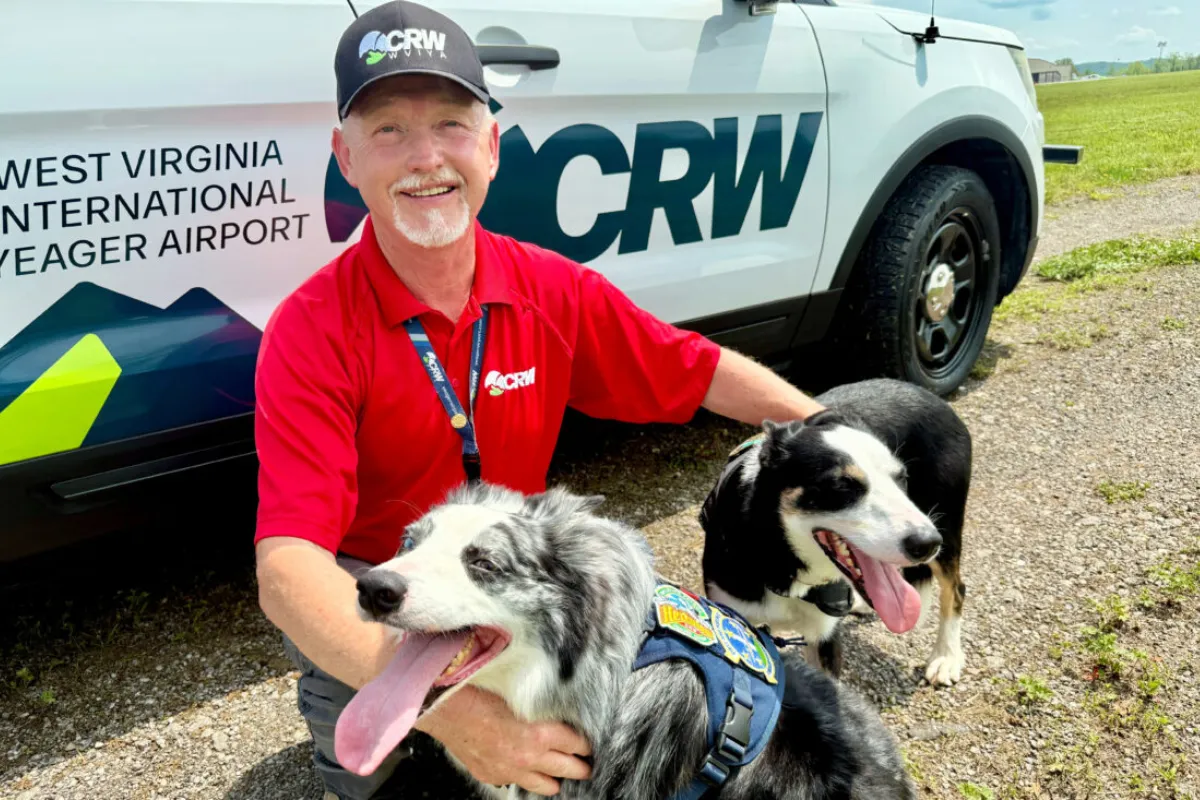At West Virginia International Yeager Airport, safety comes with four legs and a wagging tail.
Meet Hercules and Ned — two energetic border collies with an important job. These canine coworkers spend their days patrolling the milelong airfield, helping keep birds and other wildlife away from planes. It’s a simple but critical mission that protects both passengers and pilots.
Their handler, Chris Keyser, a wildlife specialist at the airport, knows firsthand how valuable their work is. “Preventing just one bird strike can make all the difference in someone’s life,” he said.
A Mission That Took Off
Wildlife collisions with aircraft are a common and serious issue at airports across the country. That’s why Yeager Airport made a bold move in 2018 — they brought in Hercules.
Hercules spent 18 months training at Flyaway Geese, a company in Charlotte, North Carolina, that teaches border collies to herd geese and other animals safely. From the moment he stepped onto Charleston’s airfield, Hercules took to his job like he was born for it.
“He took hold of the reins — it was his place,” said Rebecca Gibson, Flyaway Geese’s owner. “We’re very proud of him.”
Since then, Hercules has become a beloved fixture at the airport. He even has his own Instagram and TikTok accounts and regularly greets school groups.
A New Partner Joins the Team
Now 8 years old, Hercules has a younger sidekick. Ned, a 2-year-old border collie, joined the team last year. Like Hercules, Ned came with herding experience, trained to move goats and geese.
Ned quickly learned the ropes by shadowing Hercules. He mastered the airport’s safety protocols and now confidently chases off birds alongside his mentor.
“Ned’s ready to go,” said Keyser. “He’s doing fantastic.”
Constant Vigilance on the Mountain
Charleston’s airport sits atop a mountain and is surrounded by all kinds of wildlife — geese, hawks, ducks, songbirds, even bats. Rainy weather brings worms to the surface, which attracts more birds and increases the danger.
Keyser, Hercules, and Ned patrol the area constantly, staying in touch with the control tower and responding to any wildlife sightings. “It’s an all-day job,” Keyser said. “You’re always alert.”
Border collies are perfect for the role. Their herding instinct kicks in naturally, and while they never harm the animals, their presence is enough to scare off unwanted visitors.
“To the birds, they look like predators — like a coyote or fox,” Gibson explained.
The Real Danger of Bird Strikes
Bird and wildlife strikes aren’t just inconvenient; they’re dangerous. In 2023 alone, U.S. airports reported nearly 19,000 wildlife strikes, most involving birds. Since 1988, such incidents have caused 76 deaths and destroyed 126 aircraft.
One of the most well-known cases happened in 2009, when a plane hit a flock of geese shortly after taking off from New York’s LaGuardia Airport. The engines failed, and pilot Chesley “Sully” Sullenberger made an emergency landing in the Hudson River, saving all 155 people on board — a moment later turned into a movie starring Tom Hanks.
At Yeager Airport, wildlife strikes vary from a few per year to several dozen. In 2022, five involved bats. One older incident in 2000 involved a plane hitting two deer, resulting in serious injuries.
“Every bird strike can cause a delay, or worse,” Keyser said. “That’s why it’s so important to keep the airfield clear.”
A Gentle Paw and a Friendly Face
While Hercules and Ned are fierce on the field, they’re gentle in the terminal.
Hercules often greets passengers, offering comfort and wagging his tail for pets and belly rubs. Recently, he brought comfort to Janet Spry, a traveler dealing with both a fear of flying and the recent loss of her beloved cat.
Hercules gave her a paw, a few licks, and a big smile. “He’s making my day better,” Spry said, even joking, “I think there was an empty seat on the plane beside me.”
From chasing off birds to calming nervous passengers, Hercules and Ned have become more than just working dogs — they’re hometown heroes at West Virginia’s busiest airport.
















